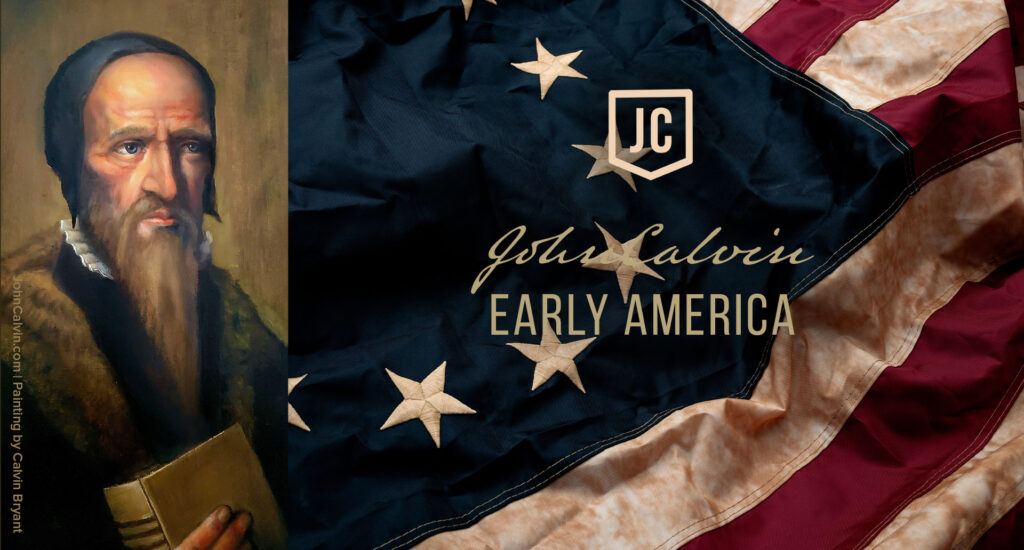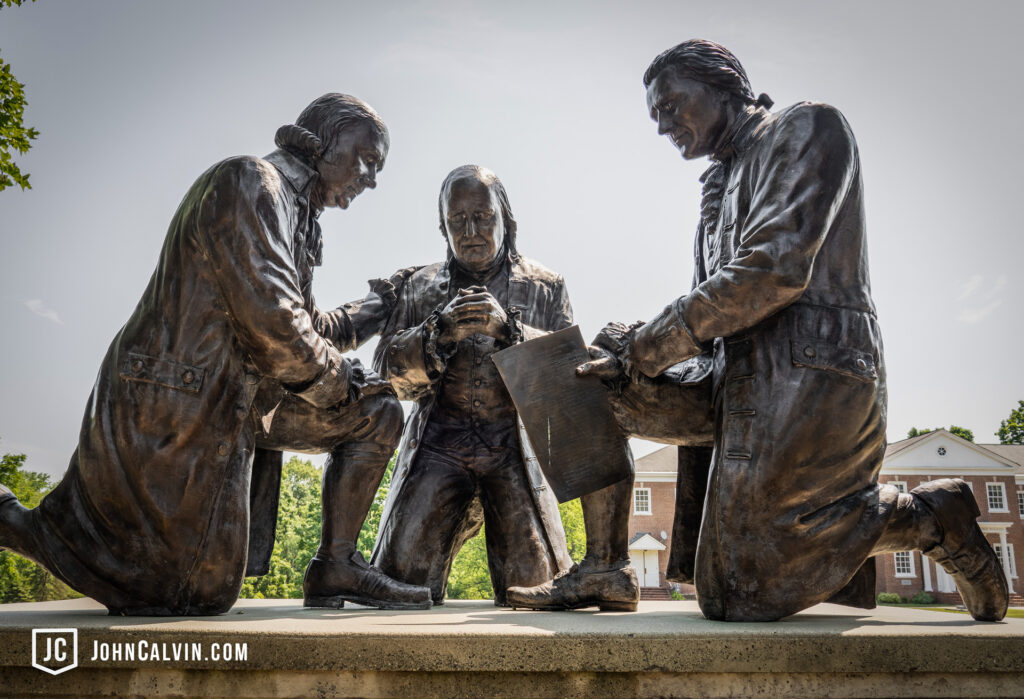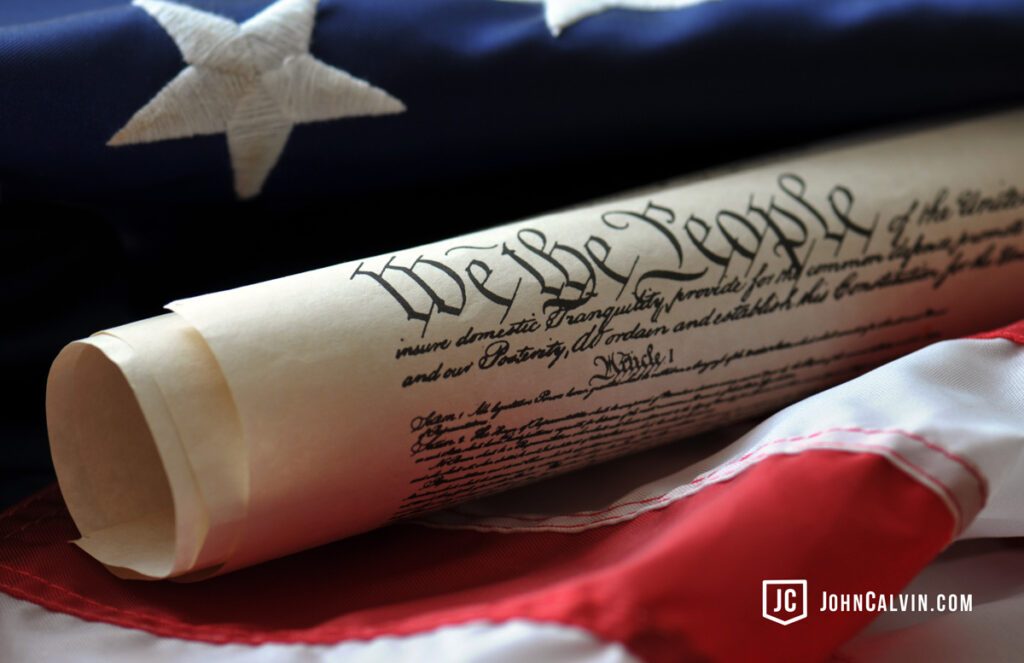Shaping American History, Religion, & Culture

Although John Calvin lived almost a full century before the first American colonies were founded, he has been named among the Founding Fathers as one of the greatest influences on the founding of the United States. Indeed, scholars continue to credit Calvin’s influence with shaping much of American history, religion, and culture, some even calling him the “virtual founder” of the nation.
While there is no doubt that Calvin’s ideas, writings, and life have been used as catalysts for much of the American project, we must be careful to distinguish between Calvin as a person and how Calvin’s teachings have been used in history. Despite Calvin’s contributions to American society, Calvin was neither a revolutionary fighting the British nor a citizen living under today’s secular government and therefore cannot be used to justify or condemn any one American belief or practice. Understanding this, we will be able to see how Calvin’s beliefs and teachings have and continue to shape social thought in America and beyond.
In this last part of our series, we will consider five elements of Calvin’s teaching that directly influenced the American understanding of freedom and government and walk through a few applications of these elements in American history. By the end, we hope to give you a few takeaways to apply in your own life.

Man’s Depravity
As we talked about earlier, Calvin stressed the sinfulness of man in his teachings. He taught that only God was good and that without God, man could do nothing good. While Calvin’s priority was to convince people to follow Christ and His commandments, Calvin also knew that corruption in human institutions was inevitable. He created systems to help curb this corruption. For Calvin, the solution to a corrupt and overarching government was to control the effects of man’s depravity and to set up a society motivated toward the common good.
We can clearly see Calvin’s concern for unchecked power in the way he set up the church and government structures in Geneva. Calvin understood that all men were fallible and thus designed a system of limited power. This was revolutionary at the time because the pope, bishops, and clergy were usually regarded as the ultimate authority in both the church and the government, with no checks on their power. Calvin instead built a church organization based on a council of elders, not a hierarchical system. Here, authority was vested in many church elders and leaders, not one bishop. This would deter any leader’s natural inclination to abuse power.
Checks and Balances
Calvin also applied this church system of internal checks on power to civil governments. While he believed that the civil government was established by God and that civil disobedience was wrong, he taught that the civil government’s authority was limited. Calvin believed that the government exists to obey God and serve its people. As such, it cannot create laws that require any citizen to sin against God. God’s law was an external check on a government’s power.
Calvin also taught that a government ought to have internal checks. He wrote about the preferred form of government in the Institutes, saying, “Owing therefore to the vices or defects of men, it is safer or more tolerable when several bear rule,” (Institutes, Bk IV. Ch. 20). He believed that a government, at the very least, should be aristocratic, meaning that a king was to rule alongside a council of nobles. These nobles would then be able to defend the people against any abuse of power. This is sometimes called the doctrine of lesser magistrates. The lesser magistrates act as a check for any unlawful authority claimed by a higher magistrate.
Practical Christianity
Calvin also stressed that Christians should live and work in their communities for the common good. He had a practical view of the faith. He taught that Christians should “foster and maintain the external worship of God, [] defend sound doctrine and the condition of the church, [] adapt our conduct to human society, [] form our manners to civil justice, … cherish common peace and tranquility, (Institutes, Bk IV, Ch. 2). Maintaining the peace and tranquility of a nation is the job of the government and of the people.
Toward this end, Calvin encouraged his church members to work hard and commit to charitable giving and service. He taught that good and moral men should be chosen for political office out of the pool of eligible citizens. Calvin also continually proposed societal reform through education. His example led to the founding of many American universities, including Princeton University. Calvin argued that if the citizenry were educated and virtuous, it would be easier to maintain a virtuous and people-oriented government. He taught that people were stewards of everything God has given. As stewards, it was the duty of all people to work toward the reformation of their own societies.
Freedom to Worship
Calvin defined a good government as one that protects and maintains the true worship of God. In the Institutes, he writes that the Scripture “warns that whatever benefits we obtain from the Lord have been entrusted to us on this condition: that they be applied to the common good of the church,” (Institutes, Bk. 3 Ch. 7).
The gift of authority given to governments was meant for the flourishing of the church. This meant that governments were not to inhibit a Christian’s right to worship God. In Calvin’s day, the Roman Catholic governments in Europe often prohibited true worship and imprisoned or killed their citizens for reading the Scriptures, participating in the Lord’s Supper, and proclaiming the faith publicly. Calvin argued that a government that did these things had failed in its very purpose. His teaching that the Scriptures were the only standard by which to judge the right worship of God had far-reaching effects on the proper understanding of the role of government in religion and faith.
Representative Government
Calvin’s establishment of representative bodies, such as the council of elders in the churches and government of Geneva, had a profound influence throughout Northern and Western Europe. As his teachings spread, churches and governments everywhere began adopting his representative structure.
Later Reformers, such as Calvin’s student John Knox, applied this representative style more directly to the civil government. This application was then handed down through Scottish and British Calvinists to the 17th and 18th century Scottish and British immigrants who arrived in America ready to establish a government structured by interdependent branches, marked by a separation of powers, and existing to serve its people.
Among the most passionate advocates of these ideas was John Witherspoon, a Scotsman and probable descendant of Knox, who became the president of Princeton University and taught James Madison, the future 4th president of the United States.

Legacy in America
It is easy to see how the above ideas have shaped the American experience, but it is helpful to explicitly point out a few applications. Calvin’s teaching about man’s depravity formed the framework for the compacts and government structures of the original colonies. The original colonists applied his doctrine of lesser magistrates to hold their political leaders under the limitations of God’s law.
This doctrine was also used to defend the colonists’ resistance to British abuses of power. Calvin’s emphasis on the glory of God and the establishment of His true Church directly influenced the mission of many of the first Americans. Consider the opening of the 1620 Mayflower Compact (this was written by the very first Pilgrims in America):
“Having undertaken for the Glory of God and advancement of the Christian Faith [], a Voyage to plant the First Colony in the Northern Parts of Virginia, do by these presents solemnly and mutually in the presence of God and one of another, Covenant and Combine ourselves together in a Civil Body Politic, for our better ordering. and preservation and furtherance of the ends aforesaid,” (William Bradford, Of Plymouth Plantation).
This phrase, “for the Glory of God and the advancement of the Christian Faith,” directly echoes Calvin’s call for people to establish a government for the good of the people and the true worship of God.
Conclusion
Calvin’s teaching marked America in its infancy and has continued to shape its culture. However, as times have changed and individuals have become less Christian, so has the nation. Part of this is because, while enjoying and implementing Calvin’s ideas of limited power, representative government, and freedom, Calvin’s successors quickly forgot his main goal.
Calvin did not defend freedom for freedom’s sake. And he certainly would not promote American freedom for America’s sake. Instead, Calvin believed that all governments and people ought to use their freedoms to declare God’s glory.
What does this mean for us today? It means at least two things. First, we should continue to work hard like Calvin. We should work hard for the good of our churches, families, local communities, state and national governments, and countries. Secondly, we should continue to boldly proclaim the gospel in every sphere of life.
Read more about John Calvin’s doctrines of Reformed Theology
Reformed Theology, The Beginnings
Learn more about the gospel of Jesus Christ and how it can change your life